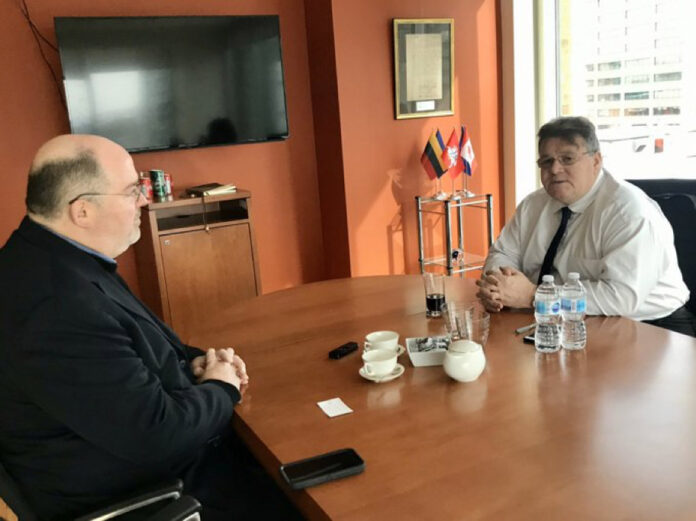
Steven Chase is a Parliamentary reporter for The Globe and Mail. He has covered federal politics in Ottawa for The Globe& MAIL
PUBLISHED FEBRUARY 28, 2020
Lithuania’s Foreign Minister is asking Canada for further help in combatting Russian disinformation campaigns, including what he describes as the Kremlin’s efforts to rewrite the history of the Second World War.
Linas Linkevicius was in Ottawa this week to meet with Foreign Affairs Minister François-Philippe Champagne and Defence Minister Harjit Sajjan.
He and other European politicians are increasingly pushing back against what he calls Russian efforts to “whitewash history” and rehabilitate not only the record of the former Soviet Union, but also dictator Joseph Stalin.
Just last month, for instance, the European Commission, the executive arm of the 27-member European Union, said publicly it would not tolerate distortion of historical facts after Russia suggested Poland was partly responsible for starting the Second World War.
This year marks the 75th anniversary both of the Allies’ victory in Europe and the end of the Second World War.
Mr. Linkevicius said the Russians’ effort to change the narrative has parallels with how it speaks about seizing Crimea from Ukraine in 2014, and support for-pro-Moscow militants fighting a war with Kyiv in Eastern Ukraine.
“They are not only legitimizing what was done decades ago, but also trying to legitimize today,” Mr. Linkevicius said.
He said it’s crucial to ensure the world remembers precisely what happened. Russia likes to emphasize its enormous contribution to ending the Second World War, but Mr. Linkevicius notes that the end of the conflict also precipitated decades of oppression of eastern European countries by the Soviets.
“This is important for Canada as well. Let’s spread meaningful narratives,” he said. It’s important to commemorate the fight against fascism, but not to forget the Iron Curtain that came down after the Second World War, he said. “For my country, it brought no liberation.”
A spokesman for Canada’s Department of National Defence said it’s important to avoid a rewriting of the history of the Second World War.
“Disinformation of this kind must be tracked diligently, as revisionist history of this nature can have damaging effects on our future,” Daniel Le Bouthillier, head of media relations, said.
“We will also continue to practise clear, transparent and truthful communications and communicate actual facts, while remaining resilient to any such kind of disinformation tactic.”
In Ottawa, Mr. Linkevicius thanked the ministers for Canada’s military deployment in Latvia, bordering Lithuania, which is part of a NATO operation to deter Russian expansionism.
More than 600 Canadian Armed Forces members are in the Baltic State, where Canada has led a multinational battle group for the North Atlantic Treaty Organization since 2017.
The Latvian deployment is part of a significant buildup of NATO member-country troops and assets on the Western military alliance’s easternmost flank, prompted by Moscow’s annexation of Crimea and its backing of pro-Russian militants in Eastern Ukraine.
Russian President Vladimir Putin suggested in December that Poland shared responsibility for the war because it connived in Nazi German plans in 1938 to dismember Czechoslovakia. The speaker of the Russian parliament has also called for Poland to apologize for starting the war.
“Everyone is entitled to his own opinion, but not his own facts. The Commission’s role here is to talk about facts,” EU Justice Commissioner Vera Jourova told the European Parliament on Jan. 20.
“The European Commission fully rejects any false claims that attempt to distort the history of the Second World War or paint the victims, like Poland, as perpetrators,” she said.
Ms. Jourova said it was in fact the pact between Nazi Germany and the Soviet Union, signed by foreign ministers Joachim von Ribbentrop and Vyacheslav Molotov on Aug. 23, 1939, that paved the way for war.
The Russian embassy in Ottawa rejected the allegation that Moscow is revising history, saying it has seen no basis for that accusation. “The hard facts are that Canada and the USSR [Union of Soviet Socialist Republics], which made decisive contributions to the defeat of Nazism … were allies in the anti-Hitler coalition,” the embassy said in e-mailed statements. It said Soviet losses in the Second World War amounted to 27 million people.
The embassy said that the 1938 Munich Agreement signed by countries including Britain and France that allowed Germany to annex part of Czechoslovakia “emboldened Hitler” at the time. “Truth and history shall not be distorted,” the embassy said.
With a report from Reuters





























